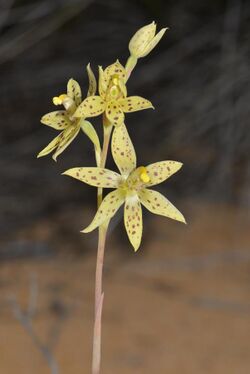Biology:Thelymitra sargentii
| Freckled sun orchid | |
|---|---|

| |
| Thelymitra sargentii growing near Northampton | |
| Scientific classification | |
| Kingdom: | Plantae |
| Clade: | Tracheophytes |
| Clade: | Angiosperms |
| Clade: | Monocots |
| Order: | Asparagales |
| Family: | Orchidaceae |
| Subfamily: | Orchidoideae |
| Tribe: | Diurideae |
| Genus: | Thelymitra |
| Species: | T. sargentii
|
| Binomial name | |
| Thelymitra sargentii R.S.Rogers[1]
| |
Thelymitra sargentii, commonly called the freckled sun orchid,[2] is a species of orchid in the family Orchidaceae and is endemic to Western Australia. It has a single thick, leathery leaf and up to twenty five strongly scented, lemon yellow flowers with brown blotches. It grows in arid areas but where it receives runoff during rainfall.
Description
Thelymitra sargentii is a tuberous, perennial herb with a single erect, leathery leaf 100–250 mm (4–10 in) long and 10–20 mm (0.4–0.8 in) wide. Between five and twenty five, lemon yellow flowers with brown blotches, 35–40 mm (1–2 in) wide are borne on a flowering stem 300–500 mm (10–20 in) tall. The sepals and petals are 16–20 mm (0.6–0.8 in) long and 5–7 mm (0.2–0.3 in) wide. The column is yellow, 6–8 mm (0.2–0.3 in) long and about 3 mm (0.1 in) wide. The lobe on the top of the anther has a notched orange tip and a warty back. The side lobes have a dense, yellow pimply end. Flowering occurs in September and October. The flowers are strongly scented, insect pollinated and open freely on warm days.[2][3][4]
Taxonomy and naming
Thelymitra sargentii was first formally described in 1930 by Richard Sanders Rogers from a specimen collected by Oswald Sargent and the description was published in Transactions of the Royal Society of South Australia.[5] The specific epithet (sargentii) honours the collector of the type specimen.[6][7]
Distribution and habitat
The freckled sun orchid mainly grows near shrubs and small trees where it benefits from runoff during rain. It grows on sandplain between Kalbarri, Kalgoorlie and Hyden.[2][3][4][8]
Conservation
Thelymitra sargentii is classified as "not threatened" by the Western Australian Government Department of Parks and Wildlife.[8]
References
- ↑ "Thelymitra sargentii". World Checklist of Selected Plant Families (WCSP). Royal Botanic Gardens, Kew. http://wcsp.science.kew.org/namedetail.do?name_id=203810.
- ↑ 2.0 2.1 2.2 Jones, David L. (2006). A complete guide to native orchids of Australia including the island territories. Frenchs Forest, N.S.W.: New Holland. p. 248. ISBN 1877069124.
- ↑ 3.0 3.1 Brown, Andrew; Dundas, Pat; Dixon, Kingsley; Hopper, Stephen (2008). Orchids of Western Australia. Crawley, Western Australia: University of Western Australia Press. p. 437. ISBN 9780980296457.
- ↑ 4.0 4.1 Hoffman, Noel; Brown, Andrew (2011). Orchids of South-West Australia. (3rd ed.). Gooseberry Hill: Noel Hoffman. p. 296. ISBN 9780646562322.
- ↑ Rogers, Richard S. (1930). "Contributions to the orchidology of Papua and Australia". Transactions and Proceedings of the Royal Society of South Australia 54: 41–42. https://www.biodiversitylibrary.org/item/129828#page/45/mode/1up. Retrieved 1 June 2018.
- ↑ "Thelymitra sargentii". APNI. https://id.biodiversity.org.au/instance/apni/456742. Retrieved 1 June 2018.
- ↑ "Sargent, Oswald H. (1880 - 1952)". Australian National Botanic Garden. http://www.anbg.gov.au/biography/sargent-oswald.html. Retrieved 1 June 2018.
- ↑ 8.0 8.1 "Thelymitra sargentii". FloraBase. Western Australian Government Department of Parks and Wildlife. https://florabase.dpaw.wa.gov.au/browse/profile/1714.
Wikidata ☰ Q15467366 entry
 |

